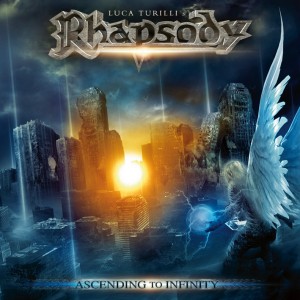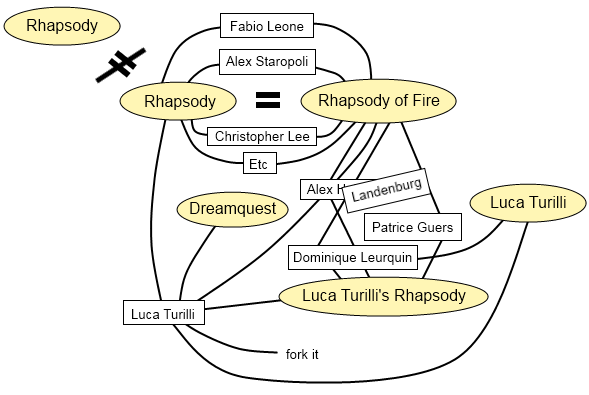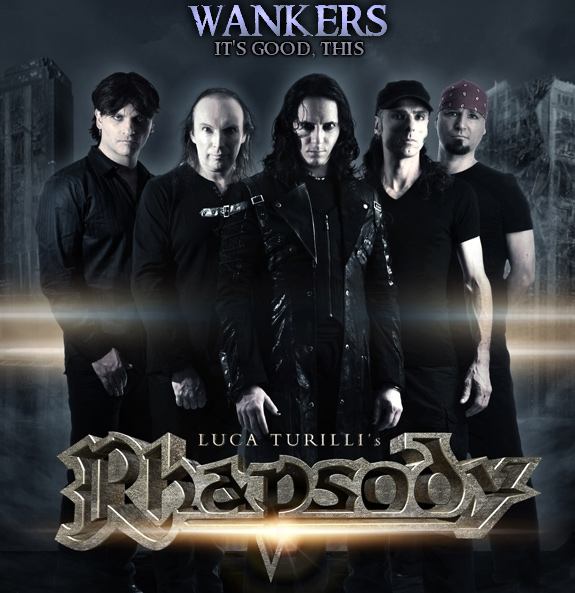Part 2 of a two-part series.  "What on earth is going on with Rhapsody?" was the first thing that I said to kjorteo after returning from the music shop two months ago. I had known that at some point Rhapsody had suffered a clash with another band with the same name and had had to change theirs to "Rhapsody of Fire", but at that moment I was holding two albums that had come from the same shelf compartment, one of which was labelled "Rhapsody" and the other "Luca Turilli's Rhapsody". A quick check of Wikipedia hadn't been much help because it listed all albums by Rhapsody, Rhapsody of Fire and Luca Turilli's Rhapsody as part of a unified "Rhapsody chronology" but under separate bands. The truth really is quite special. "What on earth is going on with Rhapsody?" was the first thing that I said to kjorteo after returning from the music shop two months ago. I had known that at some point Rhapsody had suffered a clash with another band with the same name and had had to change theirs to "Rhapsody of Fire", but at that moment I was holding two albums that had come from the same shelf compartment, one of which was labelled "Rhapsody" and the other "Luca Turilli's Rhapsody". A quick check of Wikipedia hadn't been much help because it listed all albums by Rhapsody, Rhapsody of Fire and Luca Turilli's Rhapsody as part of a unified "Rhapsody chronology" but under separate bands. The truth really is quite special.What I didn't know at that time was that Luca Turilli, the main songwriter, plotwriter and general driving force behind the band, had left Rhapsody (of Fire) in 2011 to start another project, which he... also called Rhapsody. (I don't know why they could call themselves Rhapsody but Rhapsody (of Fire) couldn't - does having the "Luca Turilli's" prefix make it all right as well?) They then released this, an album which has been promoted as "Rhapsody's 11th album" even though it wasn't done by the same band that had released the other ten - apparently both of them are now going to share the name and logo and contribute equally to a unified Rhapsody lineage. Therefore, this would appear to be the only band I know of to have not split but forked itself, as helpfully laid out in a diagram here:  Right, so - ignoring the increasingly confusing name and discography issue, Luca Turilli and bassist Patrice Guers got together with a new singer Alessandro Conti and formed a new band with former Rhapsody session guitarist Lord Voldemort and Sir Not-Appearing-On-These-Drums. Yes, on that subject - Alex Holzwarth (from Rhapsody of Fire, the original Rhapsody, but not as far back as when it was actually called Rhapsody) was going to be a member of both bands and recorded the drums for this album, but then chose to drop out of Luca Turilli's branch of Rhapsody and be in Alex Staropoli's branch of Rhapsody exclusively. Luca Turilli recruited Alex Landenburg instead, and he is the one credited as the band's drummer on this album despite not actually being on it (though a separate credit for "Drums played by Alex Holzwarth" is included). Pay no attention to the sound of Microsoft Visio melting into a sad binary heap in the background. After explaining all that madness I've still got to get around to mentioning the actual music, and I'm going to have a lot to say about that as well, because it really is... extraordinary. It's a very mature variety of metal, not in the same way as Kamelot and Sonata Arctica are (i.e. miserable) but in the grandiose orchestral sound applied to them. It's actually hard to remember that I'm listening to a band that evolved out of the original, very power metal Rhapsody I mentioned last time and not something that Symphony X evolved into in a parallel universe. Luca Turilli seems to share a strong Hideo Kojima-like desire to emulate films in his work, and I think that I can physically feel myself gradually morphing into a pretentious git just by listening to it. While anything from this album is on, I frequently find myself muttering a brief quotation by Sean Lock describing conflicting feelings, originally made referring to Top Gear, that pretty much sums up the experience of listening to it. It's often quite agonizingly pompous, but even though they've set their bar high, they really are good enough to get away with it. A lot of progressive metal becomes so flashy and experimental it turns into a bit of a mess, but this all-new Rhapsody manages to include all the showing off from each intrumentalist and the symphonic arrangements and prime-numbered time signatures without ever losing sight of the melody. It starts off with the Mortal Kombat theme before that man from those films comes in and growls in a Duke Nukem voice for a while in an introduction honestly called Quantum X. After this, the album feels rather like a classic of Iron Maiden in subject matter, with each song being based on a different piece of mythology or literature (making me honestly wonder why they're so keen to place it as the 11th Rhapsody album if it doesn't fit into their storyline). Excalibur is probably the most traditionally Rhapsody of songs here, starting off with a sort of Middle English Ancient Forest of Elves wind section and breaking in the middle for some more cheesy narration, but there are also surprising departures like Tormento E Passione, a rock-pop opera thing that I don't understand because it's in Italian (unlike the rest of the album which is in Latin). The pretentiousness culminates in a sixteen-minute song that... I absolutely promise, is called Of Michael the Archangel and Lucifer's Fall - and this is divided into three chapters, I. In Profundis, II. Fatum Mortalis and III. Ignis Divinus. Unlike most songs of this length, it isn't organized in a straight non-repeating unique sequence of parts but instead achieves a lot of its massive size by having the longest verse/chorus cycle that I have ever heard. It lasts almost four minutes for one rotation and goes through several measures each time, including a chant by a collection of opera singers credited in the booklet as the "voices of the Apocalypse". However, the absolute highlight of the album for me is Dark Fate of Atlantis, which so enthralled me that I didn't get to listening to the last three songs on the album for about a week. Songs that are promoted as singles are usually chosen on the strength of their accessibility - this one is cut from nearly seven minutes long, ventures into 5/4 and 7/4 for a couple of bars and features an orchestra and a couple of opera singers in the background with some Latin sections, and yet it never drifts into not being memorable. (It's also shocking in being the first Rhapsody video I've ever seen that doesn't look like it was shot on a phone and then stuck together by an overenthusiastic dad in Windows Movie Maker, even if they only had the budget for about twenty seconds of film and just looped them throughout). I can't quite describe what about it fascinates me the most - the way that the introduction sounds sort of like what Tyranny of Steel would have been like in a prog-metal style, the keyboard-led section it moves into, the storyline lyrics, the extra bar in the middle of the pre-chorus roughly reminiscent of a 3.5" disk error, the surprising 8-bit arpeggios during the final chorus, the conspicuous use of the word "mantis" in the chorus to mean something that it stopped meaning two thousand years ago... out of an album that I thought was so physically impossibly up its own rear end at first, it really has become the song that's stuck in my mind the most since The Savior. This is wonderful. There's one last thing that struck me about the presentation of the album, and that's the little four-word phrase that's printed proudly on the band's site and above the group photograph in the album booklet. "Born to sound cinematic" - it doesn't quite have the punch of the progenitor "Born to be wild", does it? In fact it almost beats even Link for the world's worst catchphrase. I was quite proud of the phrase "Power metal trapped in an Amiga" for Albion, but to be honest I'm struggling to come up with something that adequately describes this music as well - "Born to be epic" would be quite good if "epic" wasn't such an overused and almost completely meaningless word now. But perhaps further thought from me in this department is unnecessary. Indeed, Sean Lock above has already provided the perfect phrase that summarizes this new branch of Rhapsody's flair, style and approach to music in general.  2012-10-12 22:32:00 12 comments |
 Track the T
Track the T
